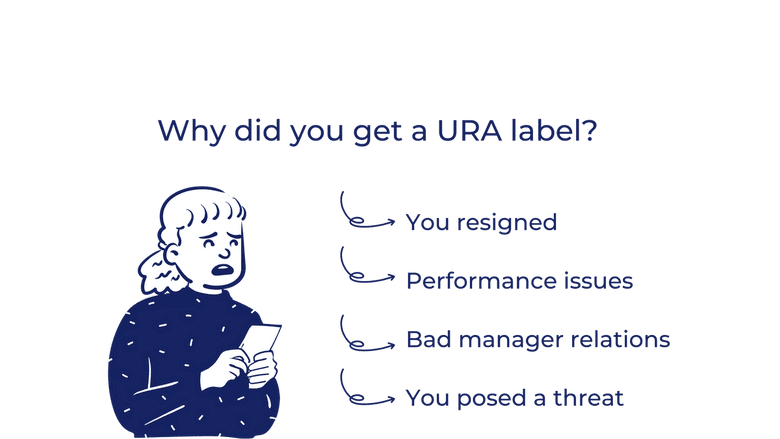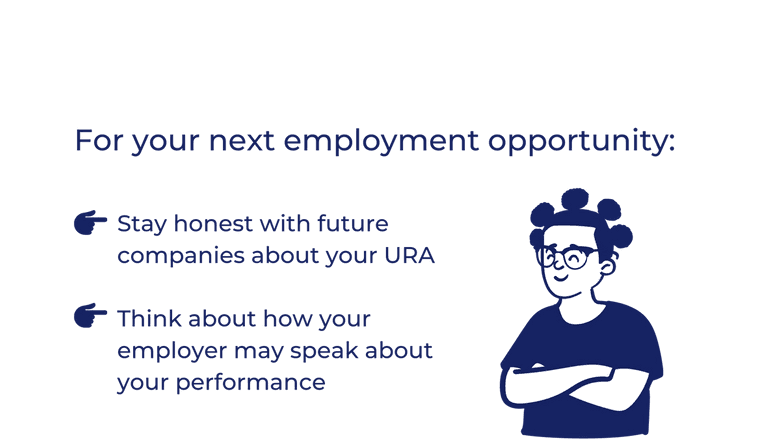Getting labelled non- rehireable and what to do about it
Yes, you can get "blacklisted" from some tech companies.
We're answering your questions about the process, its impact on your job search, and Amazon's notorious URA policy.
What does it mean?

What is "unregretted attrition" or URA?
Unregretted Attrition, or URA, is a label assigned to former employees that the company does not wish to rehire. This label will usually exist in an employment file and be known by the human resources department and an employee's former managers. It often means that, without a strong recommendation from a higher-up, there's little chance of said employee working for that company again.
Why do I have the URA label?
Employers give out the URA label for any number of reasons, ranging from harmless to extreme. On the less extreme end, employers may designate this label to anyone who resigns-- they don't want people to come back who abandoned them.
Others will give it to employees with performance issues, like chronic lateness or laziness, or simply because they don't like you.
Although problematic, being given a URA label because you had a poor relationship with your manager is not uncommon.
On the more extreme end, you may be given this label if you posed a threat to the company, whether it was physical, financial, or something else entirely. If you were given URA for a more extreme reason, it will likely appear on your background check as well. Be aware of this.
Are former employers allowed to disclose my rehire status?

This is a bit of a tricky question. The short answer is yes, but it is usually done carefully to avoid slandering you.
Throughout most of the United States, employers can not disclose much personal data about their former employees. They certainly can't provide a detailed account of your time at the company, or reasoning for why you were given URA.
When provided as a reference, employers are allowed to disclose whether you worked there, the time frame in which you did, and whether or not they would rehire you.
This is a simple "yes" or "no" question-- no further information can be provided. Extensive or related questions would risk of violating the law. However, for prospective employers who do not know you very well, this answer can speak volumes.
How will this impact my job search?

Depending on the prospective company, this could go either way. Upon learning about your URA status, some companies will drop you from the hiring process without explanation. This is especially common if your background check turns up some shady stuff, too.
However, many companies will give you the chance to explain your URA status. This is a time to be honest about personal information related to your case, and why you may be deemed "not rehireable". For example, if you know you slacked off at your old job, tell your potential employer why you lost passion for that work. Depending on your circumstances, telling your story may be painful or easy. Either way, it's necessary-- honesty is always the best policy!
If you think your former employer is intentionally preventing you from getting hired elsewhere, you may have a bigger problem. This may be the case if, despite a good economy and superior qualifications, you keep getting dropped from the hiring process time and time again. If you have well founded suspicions of your former employer slandering you, consult an attorney.
The question you're afraid to ask: how does it work at Amazon?

Amazon is notorious for their strict URA policy. While many big tech companies have strategies to get rid of dead weight (i.e. Facebook's "up or out" policy), Amazon makes larger cuts than most.
Most departments have 10% URA, which means they must fire 10% of their employees every year. To be cut by URA, one must first be on a Development Plan, or "dev plan" for short. Employees are typically put on this plan if they have unsatisfactory performance. With this plan, they are then given a month or two to improve.
If they improve, they are more likely to be safe, although it's no guarantee-- Amazon still gets rid of the bottom 10% of performers each year, and dev list candidates are usually among them.
If no improvement is seen after a dev plan, employees may be put on a Performance Improvement Plan, or "PIP". Or, if URAs are being dished out, the employee may be terminated immediately. Failing to get off the dev list poses the highest risk of being cut and given URA status.
The information provided herein is for general informational purposes only and is not intended to provide tax, legal, or investment advice and should not be construed as an offer to sell, a solicitation of an offer to buy, or a recommendation of any security by Candor, its employees and affiliates, or any third-party. Any expressions of opinion or assumptions are for illustrative purposes only and are subject to change without notice. Past performance is not a guarantee of future results and the opinions presented herein should not be viewed as an indicator of future performance. Investing in securities involves risk. Loss of principal is possible.
Third-party data has been obtained from sources we believe to be reliable; however, its accuracy, completeness, or reliability cannot be guaranteed. Candor does not receive compensation to promote or discuss any particular Company; however, Candor, its employees and affiliates, and/or its clients may hold positions in securities of the Companies discussed.
